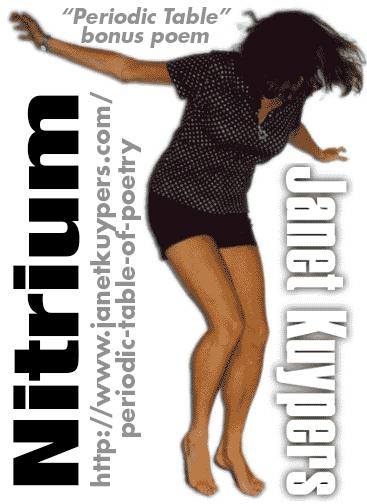
[the Writing of Kuypers] [JanetKuypers.com] [Bio] [Poems] [Prose]

See YouTube video of the Janet Kuypers reading her bonus Periodic Table Star Trek poem (based on Sodium, #11, NA) Nitrium in her 3/21/15 show Imzadi at Ch Fi 2015 in Chicago (Canon fs200) |

See YouTube video of the Janet Kuypers reading her bonus Periodic Table Star Trek poem (based on Sodium, #11, NA) Nitrium in her 3/21/15 show Imzadi at Ch Fi 2015 in Chicago (Canon Power Shot) |
 See YouTube video of the Janet Kuypers 3/21/15 show Imzadi at Ch Fi 2015 in Chicago, of poems relating to Star Trek, INCLUDING THIS POEM (this video was filmed from a fs200 camera; on Facebook, Twitter, Linkedin, Pinterest, Instagram and Tumblr).� #janetkuypers #janetkuyperspoetryshow
See YouTube video of the Janet Kuypers 3/21/15 show Imzadi at Ch Fi 2015 in Chicago, of poems relating to Star Trek, INCLUDING THIS POEM (this video was filmed from a fs200 camera; on Facebook, Twitter, Linkedin, Pinterest, Instagram and Tumblr).� #janetkuypers #janetkuyperspoetryshow
|
 See YouTube video of the Janet Kuypers 3/21/15 show Imzadi at Ch Fi 2015 in Chicago, of poems relating to Star Trek, WITH THIS POEM (this video was filmed from a Canon Power Shot camera; posted on Facebook, Twitter, Linkedin, Pinterest, Instagram, and Tumblr).� #janetkuyperspoetryshow
See YouTube video of the Janet Kuypers 3/21/15 show Imzadi at Ch Fi 2015 in Chicago, of poems relating to Star Trek, WITH THIS POEM (this video was filmed from a Canon Power Shot camera; posted on Facebook, Twitter, Linkedin, Pinterest, Instagram, and Tumblr).� #janetkuyperspoetryshow
|
|
Download this poem in the free chapbook “Imzadi”, w/ poems read on 3/21/15 at the Ch Fi 2015 convention in Chicago, including this poem. |
NitriumJanet Kuypers(bonus poem from the “Periodic Table of Poetry” series) based on the original name (before Natrium) for Sodium, #11, Na started 1/16/15, edited and completed 1/29/15 I’ve been studying elements in the Periodic Table, and when I heard the word “Nitrium,” it made me laugh (thinking of Nitrous Oxide). So I looked it up online... The only thing I could find was from the Memory Alpha in Star Trek Wikia, and they could only guess that Nitrium was either an alloy or a metallic element. But the history buff in me remembered that Nitrium is a variant of natrium, and it was the original name for the element Sodium. (I mean, doctors even call low sodium levels in the blood hyponatremia...) So as I read up at my Star Trek Wikia — I suddenly realized how essential this Nitrium really was: If you remember basic chemistry, sodium reacts violently with water, disintegrating, or even exploding (no no no, you’re thinking of salt, that’s not straight sodium, that’s why it mixes with water...) And as I read, Nitrium (which was the first name for Sodium) was prevalent in asteroids and it was used in so many places in the construction of Federation starships. Now, when it comes to our own bodies, Sodium (or should I say Nitrium) controls blood pressure and blood volume — it’s essential in our bodies to keep them running smoothly. So it makes total sense that Galaxy-glass vessels used Nitrium in their ships, from computers, to engines to their life support systems. Nitrium was so crucial to the Cost of Living — you see, I expanded my research from Star Trek Wikia to straight-up Wikipedia and discovered that parasites were eating the Nitrium all over the Enterprise, jeopardizing the ship’s integrity. Because as I’ve learned, with every Periodic Table element out there there’s a good side and a bad side: if Nitrium is used all over the Enterprise, something could easily come along to destroy it as well. I mean, think of it in our own bodies: when Sodium (or Nitrium) reacts with water and forms Sodium Hydroxide, but this reaction gets the Hydrogen so hot that it burns. And if Nitrium was the original name for Sodium, that probably explains why you never see a Galaxy-class starship entering a planet’s atmosphere, where there’s water in the air. Because really, the people at Star Trek learned that even just a little water in the air would be enough to make their starship disintegrate around them. ...Really, whenever the Enterprise actually goes to a planet, they never land on the planet with their big Galaxy-class starship, they send a shuttle, or they beam someone down, because in this case, the water in the air that’s embedded in the atmosphere, that water could react with the Sodium — oops, I mean, that water could react with the Nitrium — and it might actually do the Enterprise in. As I said, with all the elements I’ve studied, there’s a good side and a bad side to them. We might desperately need them, but they also may somehow do us in if they’re mixed in the just the right way. Because if you sit in a lab in the twenty-first century, you can watch this element react with water in a beaker — and if you’re going where no one has gone before in the twenty-fourth century, you might have to be sure your Nitrium-rich ship finds no water in space, and finds no parasites that may eat you out of your only way home. |
![]()
All rights reserved. No material

Copyright © Janet Kuypers.
may be reprinted without express permission.
![]()
![]()
![]()
![]()
![]()
![]()
![]()
![]()
![]()
![]()
![]()
![]()
![]()
![]()

![]()



